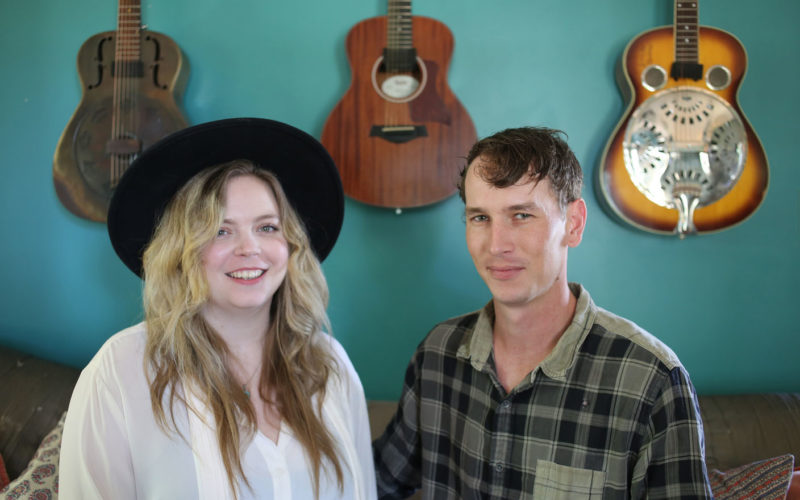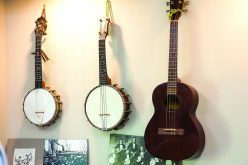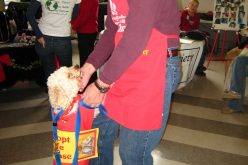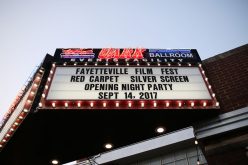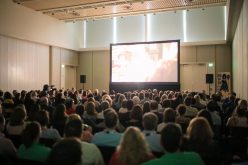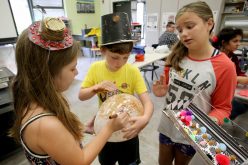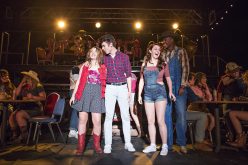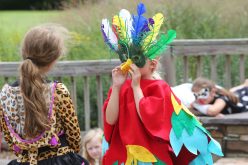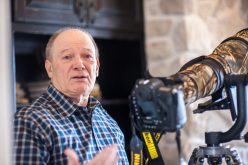Fayetteville musicians operate ‘home-style’ studio
LARA JO HIGHTOWER
lhightower@nwadg.com
“Everything down to the color scheme and the books on the wall swaddle you like a … goose down comforter. There’s plenty of space to think and lots of different places to work. It is not a temple to beer and debauchery or a place piled high with gear or a slick, big, empty room. It’s a place where the coffee is strong, and the cats are soft.”
Willi Carlisle, folk musician, author and performer of the award-winning one-man show, “There Ain’t No More: Death of a Folksinger,” talked enthusiastically about Fayetteville’s Homestead Recording studio, which is run by engineer Eric Witthans and producer Meredith Kimbrough. Carlisle has recorded two albums at Homestead and is clearly a fan.
“I remember crying, not knowing what my record was, and seeing a field of daffodils in bloom near his house,” Carlisle continued. “Being greeted by the chickens and their four cats has been one of the greatest pleasures of my music career: ‘You’re home. You’re here to work. You’re here to play.’”
“For us as a band, we have always been drawn to recordings that sound real honest,” said Isaac Duncan, a member of the band The Too’s. “A huge part of capturing that honesty is being in a place that allows us all to be relaxed and comfortable. Homestead is literally Eric and Merey’s home, so it has been a perfect place. The space allows us to record live all together as a band. To me, there’s a great balance of professional studio functionality and organic comfort that comes from working in their family home. The last time we worked at Homestead, we finished what we were working on and then sat out on the shaded patio and drank beer and laughed and chatted with Merey’s parents, who also live on the family plot. It doesn’t get better than that.”
In fact, the second one turns down the gravel driveway that leads to Homestead studios — located on 70 acres on the west side of Fayetteville — it’s obvious this is no sterile, cold, high-tech venue.
“A lot of people like recording here because it doesn’t feel like a commercial, whitewashed studio,” Witthans said. “People say, all the time, ‘It feels like I’m at home.’ One of my philosophies of recording is that what’s important is how you feel, not what kind of gear you have.”
And, apparently, there’s no lack of artists who agree with that philosophy. In its third year of existence, Homestead Recording boasts a robust list of both national and local artists as its clients. The Wirms, Handmade Moments, Buffalo Gals, Ten High and Carlisle have all recorded at Homestead in the past year. Coming up in the near future are records for Jordan Moser, Basement Brew, Alaina and Dylan Hawf and Noah Richmond.
On a recent visit, the chickens Carlisle mentioned lazily scratched at seed by the backyard fire pit that’s surrounded with vintage patio chairs. Inside, the modestly-sized 1940s farmhouse is attractive and cozy, thoughtfully and comfortably decorated with vintage accoutrements and lots and lots of vinyl records. In a small room toward the front of the house, the studio equipment blends right in to the decor, as though a music studio was the original intended purpose of the house.
Of course, it wasn’t. The couple is working out of the small farmhouse where Kimbrough’s great-grandmother once lived and tended 70 acres of farmland. Kimbrough can point out of the house’s kitchen window to where her father lives, farther up the driveway; in another direction to where her uncle lives, across a field; and down the road, where a cousin’s house is located. Family is a big part of why the couple ended up in Fayetteville.
“[Merey’s] father had been running an office out of this house, and he was moving on career-wise,” Witthans said. “He said, ‘You know, you can come live in this house if you want to.’ Merey had always wanted to live in this house, and being close to family is important to us. It’s nice being home and having this creative opportunity.”
Kimbrough and Witthans met when they were both 18 and fresh out of Fayetteville High School. Although they were in the same graduating class, and had remarkably similar interests and overlapping friend groups, it wasn’t until a summer house party at which Witthans was playing with Hleb, his high school funk band, that the two finally were introduced. Kimbrough was a musician, as well, and a member of Reed Indeed. After a short stint at the University of Arkansas, the pair decided to head to the bustling music scene of Austin, Texas. They found a kindred spirit in Austin musician Kevin Allen, and the trio formed Mother Merey and the Black Dirt, a bluesy folk band that won a spotlight in Austin, despite ample competition.
“Vocalist Merey Kimbrough’s incomparable singing over a slide resonator guitar and a boot-stomping drum beat is addictive listening,” read a review in the Austin music blog No Depression. The online music magazine Bucket Full of Nails said Merey had a “voice of an angel, albeit one with a penchant for trouble.”
It was while they were recording the first album for Mother Merey that Witthans realized recording and engineering was a field he wanted to pursue.
“We made a record with Justin Douglas in Austin and that experience — I cried when it was over,” Whittans said. “It was a beautiful, long process. It was so hard. We got done with the record and heard it, and I just started crying. Then everyone started crying. I thought, ‘This is what I want to do. I want to make people feel like that.’”

NWA Democrat-Gazette/DAVID GOTTSCHALK Eric Witthans works with the tape deck and sound board Monday, July 16, 2018, at the state-of-the-art Homestead Recording audio recording studio in Fayetteville.

NWA Democrat-Gazette/DAVID GOTTSCHALK Meredith Kimbrough sits Monday, July 16, 2018, at the paino in the living room area of her home that doubles as the state-of-the-art Homestead Recording audio recording studio in Fayetteville. The house was once lived in by Kimbrough’s great great grandmother.

NWA Democrat-Gazette/ANDY SHUPE
Willi Carlisle (right), a poet, songwriter, musician and playwright, works Friday, April 13, 2018, on his second album with Eric Witthans, owner of Homestead Recording in Fayetteville.
Whittans started sitting in on recording and engineering sessions, learning as he watched. Douglas became a mentor, notifying Whittans when he found equipment for sale at good prices. When Kimbrough’s father made the offer of the house, the two decided it was time to take the leap.
“I think we always had the idea that we were going to go to Austin and cut our teeth and learn as much as we could and then bring it back home,” said Kimbrough. “And I think we’re achieving that.”
Once back in Fayetteville, they threw themselves into getting the studio ready to open. They acquired a reel-to-reel tape recorder — something Whittans had wanted for a while. He knows staying abreast of current technology is important while, at the same time, he respects the traditions of the past.
“Something about going to tape changes the way you feel about recording,” he said.
“It puts a little more weight on the moment,” agreed Kimbrough.
“Homestead uses a great mix of the undeniably great qualities of analog tape machines, but it also has the awesome power of modern recording technology,” Duncan observed. “It’s a good mix of respecting the classics, but using what’s really cool about new technology.”
The next step: finding clients. For an area of its size, Northwest Arkansas has relatively few recording studios, but it’s not the kind of thing folks find by looking in the Yellow Pages.
“I was actually able to start recording friends’ bands a couple of months after we moved,” Whittans said. “It was a slow roll because it’s word of mouth in this line of work. I feel like I can have as many ads in the world as possible, but if someone doesn’t say, ‘Hey, this guy is really good. You should record with him,’ no one is going to come and find me.”
Soon, word started making rounds.
“My band, The Too’s, had been playing a number of shows with Damn Arkansan and Dana Louise,” Duncan said. “Both of those folks spoke really highly of Eric and Merey. Drew Walls (Damn Arkansan) had done some solo recording with Eric and had been really impressed by his style. When I heard the recordings, I really dug what I heard … When it came time to start hashing out songs for a new record, we were excited to work with Eric at Homestead.”
Homestead’s current client list includes bands of all genres.
“Eric, as a journeyman, focuses on the quality of the sound and the individual experiences of the artists, which is why you hear punk bands and folk bands, math-rock and experimental electro-pop coming from Homestead,” Carlisle said. “The quality and diversity of sound speaks louder than a thousand sponsored Facebook ads.”
Carlisle said Eric and Merey are an ideal, if busy, team: In the studio, Whittans performs multiple duties as engineer, while Kimbrough wears many hats as a producer.
“Merey’s role is housemother, cat-wrangler and mix consultant,” he said. “It’s amazing how often you forget to eat or drink water. And Merey’s background as a therapist contributes to the safe, warm feeling of the space.”
Despite the business of the studio, neither Witthans nor Kimbrough have left their own music behind. They’ve formed two new bands, Lost John and Magnolia, and will be recording in the studio with both projects soon. Kimbrough’s haunting, moody vocals are the core of Magnolia, while Witthans fronts the more upbeat Lost John, which Carlisle calls “a fusion of folk and funk.”
Making their own music in between making music for others might just be the perfect combination, Witthans said.
“I love live music, and I love being in a band, but I don’t know if the road life is something I’m cut out for,” he said. “This lets us kind of still be a part of music in the meantime, and then when our record comes out later this week, sure, we’ll go do a run.”
Returning to Fayetteville, said the couple, was the first step towards achieving that dream.
“We were naive growing up here,” Whittans said. “I feel like it’s a common thing: You get tired of it, then you go out and get your world experiences. Then you move back — and just take a deep breath.”

